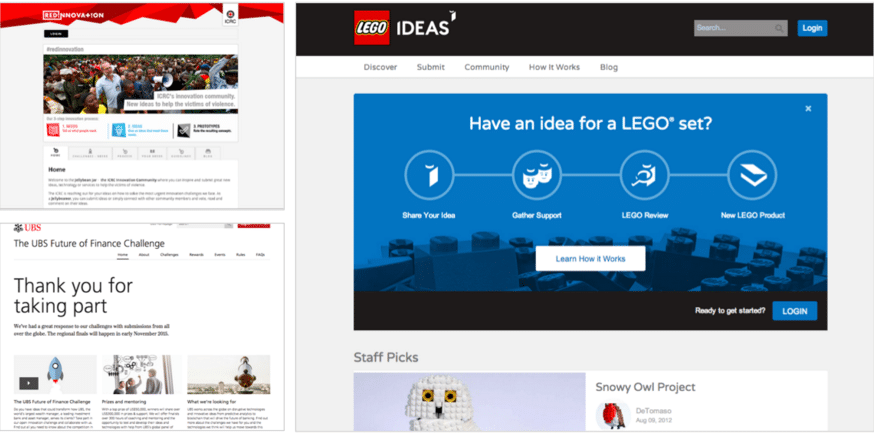Ahead of CSW Global 2016, April 11-15, Roland Harwood, Co-Founder and Managing Director of 100%Open, shares practical and pragmatic ways to make that all important breakthrough in finding your open innovation ecosystem. Join Roland at Crowdsourcing Week Global on Wednesday, April 14 in London when he will speak about more about Unlocking Open Innovation Ecosystems.
Many of the world’s most successful companies and organisations are building open innovation platforms and communities and repositioning their brands as part of a global innovation network.
Building on some of our experience of communities and crowds with the likes of LEGO, UBS and Red Cross, we have learned that the success of open innovation ecosytems is never just about well functioning technology, although that certainly helps, but works best with the following five ingredients:
1. Burst of intense activity is better than persistent communities – To achieve great things, Leonard Bernstein said you need two things; a plan and not quite enough time. Many crowdsourcing technology companies like to sell long term licenses which makes sense for them but does it make sense for you? In our experience crowds convene for a period of time when it’s useful and interesting to them and then dissipate just as quickly once their needs or curiosity has been met. Therefore plan for the exit as much as the launch and leave them wanting more, rather than wishing it were over.
2. An equal mixture of engaging online and offline activities – As wonderful as digital tools and technology can be, there is simply no substitute for being in a room with other people to think, work and play together. The best crowdsourcing competitions and programmes that we have been involved with combine a relatively equal mix of online and offline activity which can create a virtuous cycle of energy and engagement if phased smartly.
3. Diverse perspectives equally represented and heard – Any group of people will have dominant characters who will contribute more than others. These are vital fire starters, but also need to be carefully managed, so that other more reluctant participants can have the opportunity to contribute. A simple technique we’ve found is simply to ask everybody the same question together and only share the results once everybody has contributed. That way you hear from everybody and can focus on areas of difference and bank any areas of agreement.
4. A clear combination of synchronous and asynchronous ways to participate – Similar to point two above but there is a time and a place to get together at the same time to think together and bounce ideas and energy off each other. At other times it’s important to have time to digest, to think and to process what is being discussed and shared. So once again, it’s worth scheduling a clear process and ways the community can come together in waves at different times.
5. And lastly there is no substitute for bold ambitions and sheer hard graft – This one requires no further description other than to say, start at the end with a big hairy audacious goal and resist the temptation to share all of your doubts why it won’t work. You never know what might happen. And lastly don’t be fooled into thinking that open innovation ecosystems are about getting something for nothing. At their best they can be your greatest asset, but the network needs feeding and is a voracious eater so make time to put the work in. As with all things in life that matter, the more you give, the more you get.
Head over to the Crowdsourcing Week Global 2016 hub for more insights, expertise and passion of the thought leaders and innovators speaking at this year’s conference. Join us 11-15 April in London for a week of fresh ideas and insights on the global Crowd Economy. Register here for exclusive pricing, available only for limited time.





0 Comments